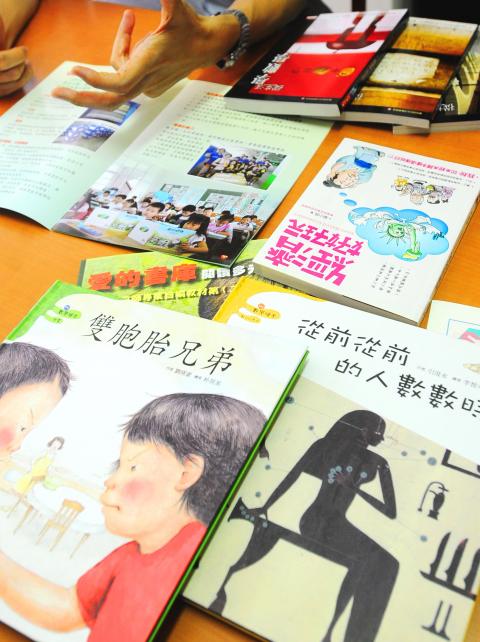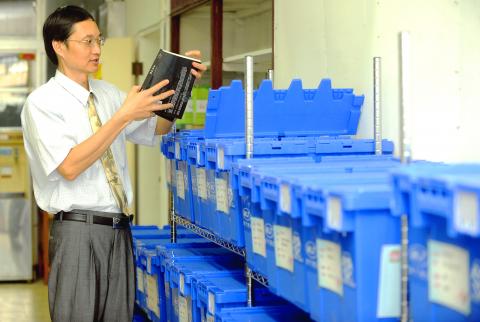In the aftermath of the 921 Earthquake, while efforts to repair and rebuild infrastructure were highly successful, unease continued to overshadow the minds of earthquake victims traumatized by the event.
The epicenter of the magnitude 7 quake on Sept. 21, 1999, was near Jiji Township (集集), Nantou County.
A death toll of 2,415, injuries numbering 11,305, and NT$300 billion (US$10 billion at current exchange rates) in damages made the earthquake the nation’s second deadliest, following behind only the 1935 Hsinchu-Taichung earthquake.

Photo: Wang Yi-sung, Taipei Times
Chen Yi-cheng (陳一誠), a teacher at Nantou County Shiukuang Senior High School, got to thinking how to help children impacted by the disaster, and came to the surprisingly simple solution of getting his students to read extra-curricular books.
“The greatest weapon in the arsenal of an educator is text, and I thought that reading would help calm their minds,” Chen said.
However, the endeavor was plagued with problems almost from the start.

Photo: Wang Yi-sung, Taipei Times
With the school located in Caotun Township (草屯), students had to bus into the more populated urban centers in order to visit book stores, such as the Eslite chain.
Many parents, whose ideas on education clashed with Chen’s, were reluctant to dole out funds for extra-curricular books, posing a significant obstacle to his idea of the students buying their own books.
Chen and his colleagues had at first tried to circumvent such problems by instituting a reading group system, in which the teachers would only have to buy one book, and these books would be shared across classes.
With 10 classes, and 10 teachers, there would be a greater pool of books to choose from, he said.
“There was significant difficulty in gaining momentum, as the teachers could not continue to pay for the students,” Chen said.
It was then that he thought of the possibility of raising funds from the private sector and paid a visit to Liao Lu-li (廖祿立), president of Merry Electronics Co in 2004, whom he had met while as a volunteer in another organization.
Liao readily agreed to contribute to the endeavor and pledged NT$200,000, while also persuading Universal Scientific Industrial Co president Wu Hui-huang (吳輝煌) to chip in another NT$200,000.
With the resources and support from other figures, such as former Nantou County Education Bureau head Liu Chung-cheng (劉仲成) and the 921 Earthquake Disaster Reconstruction Foundation, Chen had the foundation of what he named the “Philanthropic Library” (愛的書庫).
When the foundation was about to disband due to the government’s declaration in 2006 that reconstruction had been completed, manager of the foundation, Hsieh Chih-cheng (謝志誠), asked Liao to take over the management of the library, giving birth to the Taiwan Reading and Culture Foundation.
At present, there are more than 165 Philanthropic Libraries across the nation, as well as one at the Cerritos Chinese School in Artesia, California, Chen said, adding that there were a total of 560,000 books across all the libraries.
An online system set up by Chen allows users to check out books from across the network.
“We have an agreement with HCT Logistics and they help move the books from one library to another,” he said.
“Educational resources should be shared,” Chen said, adding that “if children develop a habit of reading from a young age, it is a habit that sticks with them their whole life.”
Chen said that he hoped the Philanthropic Library would continue to grow to give Taiwanese children the chance to gain an intimate appreciation of books.
He also said that the Philanthropic Library may be able to assist the government when the new 12-year national education program is launched next year.
The Ministry of Education is promoting the reading of extra-curricular books of the students’ own choosing during the morning self-study period, instead of using it for tests, Chen said.
The Philanthropic Library encourages the teacher to select books for the students, which Chen said allowed for in-depth reading and after-reading discussions.

PRAISE: Japanese visitor Takashi Kubota said the Taiwanese temple architecture images showcased in the AI Art Gallery were the most impressive displays he saw Taiwan does not have an official pavilion at the World Expo in Osaka, Japan, because of its diplomatic predicament, but the government-backed Tech World pavilion is drawing interest with its unique recreations of works by Taiwanese artists. The pavilion features an artificial intelligence (AI)-based art gallery showcasing works of famous Taiwanese artists from the Japanese colonial period using innovative technologies. Among its main simulated displays are Eastern gouache paintings by Chen Chin (陳進), Lin Yu-shan (林玉山) and Kuo Hsueh-hu (郭雪湖), who were the three young Taiwanese painters selected for the East Asian Painting exhibition in 1927. Gouache is a water-based

A magnitude 4.1 earthquake struck eastern Taiwan's Hualien County at 2:23pm today, according to the Central Weather Administration (CWA). The epicenter of the temblor was 5.4 kilometers northeast of Hualien County Hall, at a depth of 34.9 km, according to the CWA. The earthquake's intensity, which gauges the actual effect of a temblor, was the highest in Hualien County, where it measured 2 on Taiwan's 7-tier intensity scale. The quake also measured an intensity of 1 in Yilan county, Taichung, Nantou County, Changhua County and Yunlin County, the CWA said. There were no immediate reports of damage or injuries.

OFF-TARGET: More than 30,000 participants were expected to take part in the Games next month, but only 6,550 foreign and 19,400 Taiwanese athletes have registered Taipei city councilors yesterday blasted the organizers of next month’s World Masters Games over sudden timetable and venue changes, which they said have caused thousands of participants to back out of the international sporting event, among other organizational issues. They also cited visa delays and political interference by China as reasons many foreign athletes are requesting refunds for the event, to be held from May 17 to 30. Jointly organized by the Taipei and New Taipei City governments, the games have been rocked by numerous controversies since preparations began in 2020. Taipei City Councilor Lin Yen-feng (林延鳳) said yesterday that new measures by

‘WORSE THAN COMMUNISTS’: President William Lai has cracked down on his political enemies and has attempted to exterminate all opposition forces, the chairman said The legislature would motion for a presidential recall after May 20, Chinese Nationalist Party (KMT) Chairman Eric Chu (朱立倫) said yesterday at a protest themed “against green communists and dictatorship” in Taipei. Taiwan is supposed to be a peaceful homeland where people are united, but President William Lai (賴清德) has been polarizing and tearing apart society since his inauguration, Chu said. Lai must show his commitment to his job, otherwise a referendum could be initiated to recall him, he said. Democracy means the rule of the people, not the rule of the Democratic Progressive Party (DPP), but Lai has failed to fulfill his